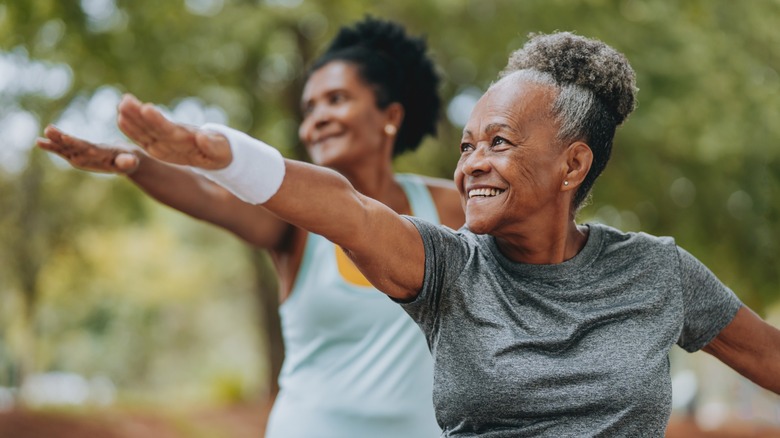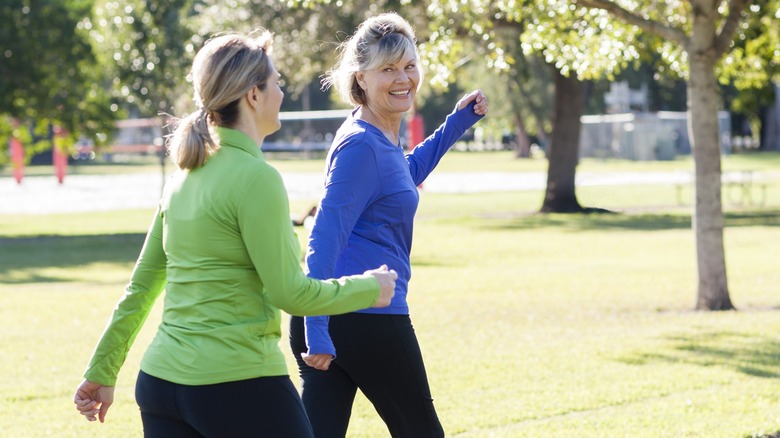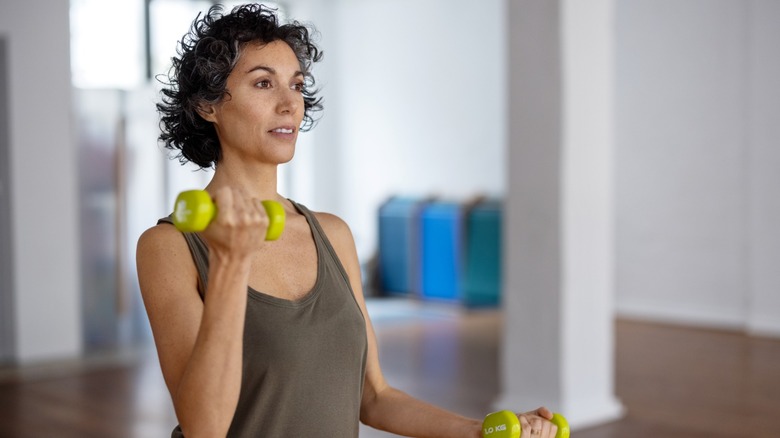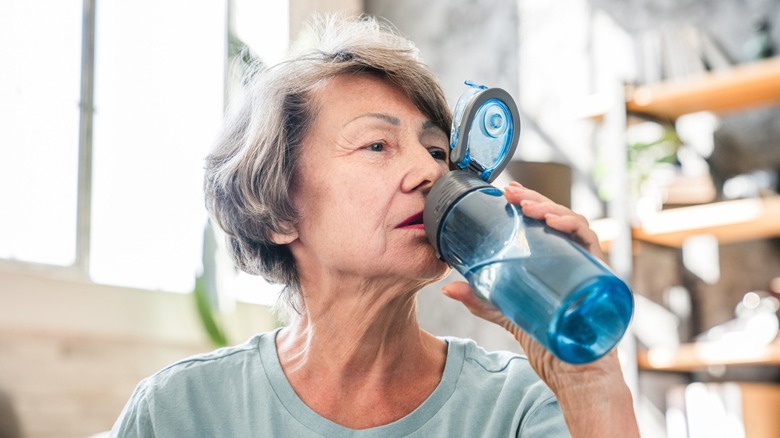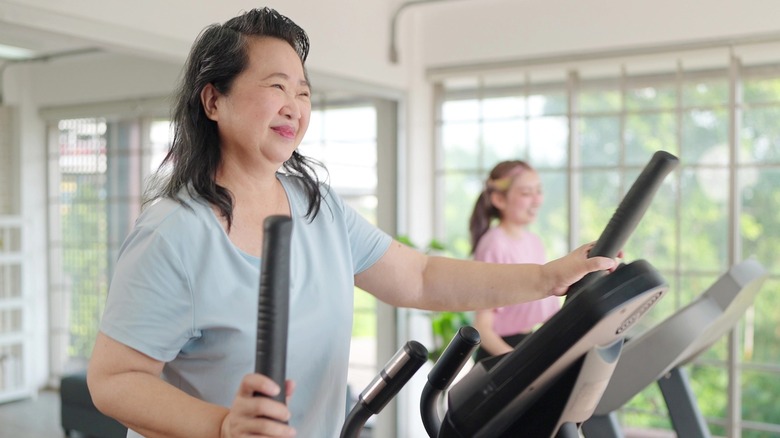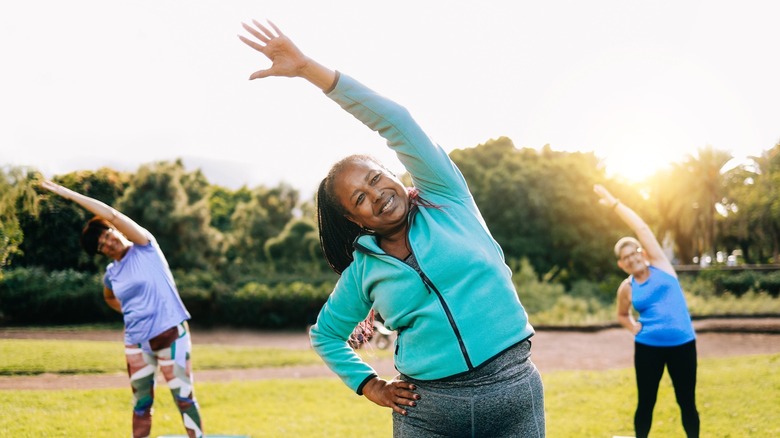How To Get Into Exercising In Your 50s And Beyond (Because It's Never Too Late To Get Healthy)
Maybe you used to be an avid gym goer whose fitness journey faded, or maybe you want to start working out for the first time. No matter why you're looking to get into exercise after 50, it's never a bad idea to start. It's never too late to embrace a healthier lifestyle and you're certainly not alone taking exercise more seriously later in life.
"I often meet women who are beginning their exercise journey again after 50 or even for the first time. It's certainly not uncommon for women over 50 to feel that they don't need to exercise anymore if they're not trying to lose weight, however, there are so many reasons to continue working out at 50 and beyond," says Dr. Gowri Rocco MD., MS., a functional, integrative, regenerative doctor, specializing in women's health and bio-identical hormone replacement therapy. "In addition to the physical health benefits, there are mental health advantages as well," she added, noting regular workouts can also help boost confidence and cognitive function.
But there are a few precautions to keep in mind to make sure working out after 50 is safe. Dr. Rocco shared her exclusively fitness tips with WOMEN, so you can make sure you're getting the most from your exercise sessions every time.
Start with low impact workouts
There's no one-size-fits all workout routine for over 50s looking to kickstart their fitness journey, but there are a few general guidelines to follow. "I advise starting slowly about three to four times a week, with low-impact workouts," Dr. Gowri Rocco shared, suggesting 20 to 30 minutes of walking (either outdoors or on a treadmill with a slight incline) as a solid starter exercise for most abilities. "I prescribe walking outside every day to all of my patients, as it helps us stay grounded, get some very needed Vitamin D, and get our blood pumping. Walking is one of the best ways to support longevity and heart health, it will add years to your life," she added, noting an early morning walk is a great way to start your day.
Strength training with weights can also be hugely beneficial (that's why it's a good way to stay physically healthy in your 60s and beyond, too!) "Light weights, with only a few sets, are an effective way to start," Dr. Rocco said. Just remember to protect your back when lifting weights, as it can be easy to take the wrong form and be prone to injury.
Don't push yourself too far
It's easy to fall into the trap of pushing yourself too far, especially if you used to workout vigorously. You may feel beginner exercises are too easy, but that doesn't necessarily mean you should immediately move on to intermediate methods. "I advise women to begin slowly," Dr. Gowri Rocco told us. "You'll most likely need to start out with lighter weights at first and perhaps fewer repetitions and build up to more. This is perfectly normal," she added. Remember your body may have changed since you last had a serious exercise routine, so what worked for you before may not work now. At least not yet.
No matter if you're a former gym bunny or are starting for the first time though, Mayo Clinic recommends upping your activity by a maximum of 10% each week to avoid injury. If you have a pre-existing injury or medical condition, speak to a health professional first for tailored advice on a good starting level and to create a safe progression plan. When you feel ready for it, Britain's NHS guidelines suggest 150 minutes of moderate exercise (or 75 minutes of something more vigorous) over four or five days a week, also recommending those over 65 do light activity every day.
Take rest and recovery seriously
An effective rest period is just as important as exercise, especially as we get older. "You might feel exhausted after your workouts during the first few weeks at the gym. This is also a normal reaction from your body being pushed in a new direction or way it hasn't been for a long time," Dr. Gowri Rocco said. "Allow yourself to rest and let your body recover to what you're introducing it to." By letting your body have ample recovery time, you'll be able to do your best every time you workout instead of dialling things down due to muscle soreness or injury. How much time you need will depend on your body and ability, but it's a good idea to wait at least 48 hours before working out the same muscle group in the beginning. You may also want to think twice about working out if you're sick to avoid making your symptoms worse, resulting in more time away from the gym.
Dr. Rocco recommended adding supplements to your diet to aid muscle recovery. "Taking Vitamin D3, creatine, and collagen all help," she said, also suggesting adding a little Himalayan sea salt or Celtic salt to your drinking water. "This helps replenish tissues and not get dehydrated, feel overly sore or tired," she said. But always check with your medical professional before changing your diet, especially if you're on medication.
With or without salt though, you should be drinking plenty of water. New York Health suggests consuming 500 to 600ml pre-workout, 240ml for each 10 minutes you're exercising, and 480ml post-session to stay properly hydrated.
Set realistic goals and don't compare yourself to others
The media is full of unbelievable weight loss stories and body transformations, as well as celebrities who appear to be in the best shape of their lives in their 50s or later. Of course, it's definitely possible to be in great health after 50 (Jennifer Lopez and her killer legs spring to mind) but everyone is different, so it's vital to set realistic goals for yourself that relate to your body — not someone else's. Dr. Gowri Rocco pointed out many celebs over 50 who look as toned as 30-year-olds have personal trainers and chefs, which isn't practical for all of us. Celebrities and social media stars can also make use of clever editing and lighting in photos, because what we see on the likes of Instagram, TikTok, and magazine covers doesn't always tell the whole truth.
If you're working out with the goal of losing weight, be realistic about how much you can safely lose. "If you want to lose 20 pounds, it might not take three weeks as it did in your 20s, so don't feel discouraged if it takes maybe two or three months," Dr. Rocco said. "Remember it takes time." Mayo Clinic recommends setting an initial target of losing around 5% of your body weight by losing one or two pounds each week.
Be realistic about how much you can exercise too. While a retired person may be able to commit to five days a week at the gym, someone still working or who has family commitments may only be able to workout three times a week or less. Just focus on moving as much as you can.
Join an exercise class
Getting back into a fitness routine or starting one for the first time can be daunting, especially in your 50s and beyond, but signing up to a group fitness class may make things easier. "I highly recommend joining classes such as Pilates and aerobic dance," Dr. Gowri Rocco shared. "A professional will guide you through a routine, and these types of classes are fantastic for improving cardiovascular health, enhancing flexibility, and supporting joint stability as we age," she added. Some locations may offer specific workouts for over 50s too, allowing you to reach your fitness goals alongside people with similar abilities.
There are scientific studies suggesting group workouts can have more of an effect on our bodies than taking on aerobic exercise solo. A 2012 study found working out with others not only improved the participants' performance, but also made them more motivated to exercise longer. Exercising with several people also means you're less likely to be lumbered with a flaky workout buddy.
There are social benefits to getting active with a group, too. "Classes give you a chance to socialize and have fun getting healthier," Dr. Rocco shared, as it can be a great place to meet people around the same age with similar interests, which can be tougher later in life. "[Making friends] is very important as we age to prevent feelings of loneliness while boosting confidence," she said.
